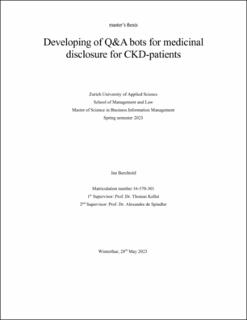Please use this identifier to cite or link to this item:
https://doi.org/10.21256/zhaw-29324Full metadata record
| DC Field | Value | Language |
|---|---|---|
| dc.contributor.advisor | Keller, Thomas | - |
| dc.contributor.advisor | de Spindler, Alexandre | - |
| dc.contributor.author | Berchtold, Jan | - |
| dc.date.accessioned | 2023-12-08T11:48:20Z | - |
| dc.date.available | 2023-12-08T11:48:20Z | - |
| dc.date.issued | 2023 | - |
| dc.identifier.uri | https://digitalcollection.zhaw.ch/handle/11475/29324 | - |
| dc.description.abstract | This thesis was a subproject of the RealCo project by Prof. Dr. Thomas Keller at ZHAW which provides information about a medication called SGLT2 inhibitors to patients with chronic kidney disease (CKD). While the goal of the project is to improve patient health literacy and compliance, this thesis rather focused on developing a chatbot to answer questions related to the use of SGLT2 inhibitors to CKD patients. Chatbots, as software components that communicate with users via natural language, are considered as an appropriate instrument for improving health literacy. The developed chatbots were implemented using natural language understanding (NLU) platforms, which, due to their structure, enable rapid prototyping, deployment and simple integrations. This thesis addressed the question of which NLU platform is most suitable for the use case. In this thesis, two artefacts were built with over 800 training questions about SGLT2 inhibitors to answer the question above. The developed chatbots were tested with physicians and pharmacists for correctness. The results showed that DialogFlow and Watson Assistant are the most popular and widely used NLU platforms were therefore selected for the chatbot development. The tests conducted and the feedback gathered from physicians and pharmacists showed that the answers were medically correct and the chatbot was perceived as friendly and appealing. Also, in the majority of cases, users received an answer that was relevant to their question. The implementation of the chatbots in these two platforms demonstrated that Watson Assistant was superior to DialogFlow in terms of latency as well as the delivery of the correct answer to the question asked. Future studies using the existing chatbots within the RealCo project should involve patients for testing and further development. | de_CH |
| dc.format.extent | 61 | de_CH |
| dc.language.iso | en | de_CH |
| dc.publisher | ZHAW Zürcher Hochschule für Angewandte Wissenschaften | de_CH |
| dc.rights | https://creativecommons.org/licenses/by-nc-nd/4.0/ | de_CH |
| dc.subject.ddc | 410.285: Computerlinguistik | de_CH |
| dc.subject.ddc | 616: Innere Medizin und Krankheiten | de_CH |
| dc.title | Developing of Q&A bots for medicinal disclosure for CKD-patients | de_CH |
| dc.type | Thesis: Master | de_CH |
| dcterms.type | Text | de_CH |
| zhaw.departement | School of Management and Law | de_CH |
| zhaw.publisher.place | Winterthur | de_CH |
| dc.identifier.doi | 10.21256/zhaw-29324 | - |
| zhaw.originated.zhaw | Yes | de_CH |
| Appears in collections: | MSc Wirtschaftsinformatik | |
Files in This Item:
| File | Description | Size | Format | |
|---|---|---|---|---|
| 2023_Berchtold_Jan_MSc_IWI.pdf | 881.43 kB | Adobe PDF |  View/Open |
Show simple item record
Berchtold, J. (2023). Developing of Q&A bots for medicinal disclosure for CKD-patients [Master’s thesis, ZHAW Zürcher Hochschule für Angewandte Wissenschaften]. https://doi.org/10.21256/zhaw-29324
Berchtold, J. (2023) Developing of Q&A bots for medicinal disclosure for CKD-patients. Master’s thesis. ZHAW Zürcher Hochschule für Angewandte Wissenschaften. Available at: https://doi.org/10.21256/zhaw-29324.
J. Berchtold, “Developing of Q&A bots for medicinal disclosure for CKD-patients,” Master’s thesis, ZHAW Zürcher Hochschule für Angewandte Wissenschaften, Winterthur, 2023. doi: 10.21256/zhaw-29324.
BERCHTOLD, Jan, 2023. Developing of Q&A bots for medicinal disclosure for CKD-patients. Master’s thesis. Winterthur: ZHAW Zürcher Hochschule für Angewandte Wissenschaften
Berchtold, Jan. 2023. “Developing of Q&A Bots for Medicinal Disclosure for CKD-Patients.” Master’s thesis, Winterthur: ZHAW Zürcher Hochschule für Angewandte Wissenschaften. https://doi.org/10.21256/zhaw-29324.
Berchtold, Jan. Developing of Q&A Bots for Medicinal Disclosure for CKD-Patients. ZHAW Zürcher Hochschule für Angewandte Wissenschaften, 2023, https://doi.org/10.21256/zhaw-29324.
Items in DSpace are protected by copyright, with all rights reserved, unless otherwise indicated.